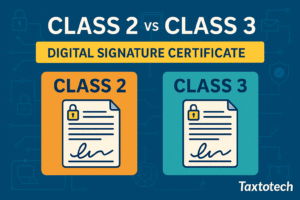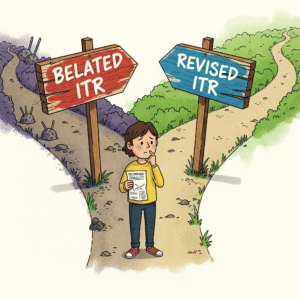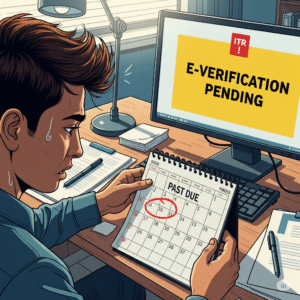In today’s digital-first economy, how do you sign a legally binding document, file a government return, or submit a high-value tender without a pen and paper? The answer lies in a powerful and secure technology: the Digital Signature Certificate (DSC). For many Taxtotech Readers, a DSC is an essential tool for business and compliance, yet it’s often shrouded in technical jargon.
What are the different “classes” of DSCs? Who needs one? How does it actually work? This comprehensive guide, brought to you by the digital compliance experts at Taxtotech, will demystify the DSC. We’ll explain its critical role in online security, clarify the evolution of its classes, and provide a deep dive into the current “gold standard”—the Class 3 DSC—so you can navigate the digital landscape with confidence.
What is a Digital Signature Certificate (DSC)? More Than Just a Signature
Think of a DSC as your digital identity, equivalent to a physical passport or driver’s license but for the online world. It is a secure digital key, issued by a licensed Certifying Authority (CA), that validates your identity when you conduct transactions online. When you sign a document with a DSC, it provides three core pillars of security:
- Authentication: It serves as undeniable proof of your identity. When you use your DSC, you are telling the recipient that you are who you say you are.
- Data Integrity: The signature links itself to the document. If even a single character in the document is altered after signing, the signature automatically becomes invalid. This ensures that the document you signed is the exact same one the recipient sees.
- Non-Repudiation: This is a crucial legal concept. It prevents you from later denying that you signed the document. A DSC provides strong evidence that you were the one who authorized the transaction.
Essentially, a DSC is like a tamper-proof digital wax seal and a government-issued ID rolled into one.
The Evolution of DSC Classes: The Old vs. The New Standard
This is where most of the confusion arises. For years, DSCs were issued in three different classes, each with a varying level of trust and verification. While you may still see references to these old classes online, it’s vital to know that the system has been streamlined for enhanced security.
To provide context, here is a look at the legacy system, which has been largely discontinued for new applicants by the Controller of Certifying Authorities (CCA) of India.
| Legacy DSC Class | Level of Assurance | Primary Use (Historically) | Status in 2025 |
|---|---|---|---|
| Class 1 | Low | Basic email signing, confirming name and email address. | Discontinued |
| Class 2 | Medium | Used for company registrations, GST, and Income Tax filing. Required basic identity and address verification. | Discontinued |
| Class 3 | High | Required for e-tendering, e-auctions, and court filings. Involved a higher level of verification. | Became the Standard |
The government phased out Class 1 and Class 2 certificates to create a more secure and unified digital ecosystem. As of 2025, when you apply for a new Digital Signature Certificate (DSC), you will be issued a Class 3 DSC.
A Deep Dive into Class 3 DSC: The Gold Standard for 2025
Class 3 is now the highest and only class of DSC being issued to individuals and organizations in India. It offers the strongest level of assurance because the verification process is the most rigorous. To obtain a Class 3 DSC, an applicant must present themselves before a Registration Authority (RA) and prove their identity, often through live video verification and document submission.
This high-security standard means a Class 3 DSC is now used for all purposes that previously used Class 2, in addition to its original high-security applications.
Who Needs a Class 3 DSC?
A Class 3 DSC is essential for:
- Companies and LLPs: For filing forms with the Ministry of Corporate Affairs (MCA), such as annual returns and financial statements.
- Directors and Partners: Every director of a company needs a DSC for various filings.
- Taxpayers: Individuals and corporations who need to file income tax returns and whose accounts must be audited.
- GST Filers: For filing GST returns and registration.
- Businesses in E-Tendering: To participate in any online government tender or e-auction.
- Professionals: Chartered Accountants (CAs), Company Secretaries (CSs), and tax consultants need a DSC to file documents on behalf of their clients.
- Importers and Exporters: For online filings with the Directorate General of Foreign Trade (DGFT).
Top 5 Applications of a DSC in India
The use cases for a DSC are vast and integrated into nearly every aspect of business compliance.
| Application Area | Why DSC is Required | Key Users |
|---|---|---|
| Income Tax Filing | To sign and submit tax returns for individuals/companies subject to tax audit u/s 44AB. | Individuals, Companies, CAs |
| Goods and Services Tax (GST) | For authenticating GST registration, filing returns (GSTR-3B, GSTR-1), and submitting refund claims. | All registered businesses and GST Practitioners. |
| Ministry of Corporate Affairs (MCA) | For all electronic form submissions, including company incorporation, annual returns, and changes in directorship. | Companies, LLPs, Directors, CSs. |
| E-Tendering / E-Procurement | To securely bid for government and private sector tenders on various e-procurement portals. | Contractors, Suppliers, Businesses. |
| Employee Provident Fund (EPF) | For employers to attest and approve online transfer claims and other submissions on the EPFO portal. | Authorized signatories of companies. |
The Taxtotech Advantage: Seamless Digital Compliance
A Digital Signature Certificate (DSC) is a fundamental tool, but it’s just one piece of your overall compliance puzzle. Filing your taxes, managing corporate responsibilities, and running your business requires a platform that understands and integrates these digital necessities.
At Taxtotech, we build solutions that simplify this complex landscape. Our platform is designed to work seamlessly with mandatory compliance tools like the DSC, making your tax and corporate filings smooth, secure, and efficient. We handle the complexities of the digital world so you can focus on what you do best—running your business. To learn how we can simplify your entire digital compliance journey, visit us at https://taxtotech.com.
Conclusion: Your Key to the Digital World
For Taxtotech Readers, understanding the Digital Signature Certificate (DSC) is key to participating securely in India’s digital economy. Remember that Class 3 is now the universal standard, offering the highest level of security for all your important online transactions, from tax filing to high-value tenders. By obtaining and properly securing your DSC, you are not just fulfilling a legal requirement; you are empowering your business with integrity, authenticity, and confidence in the digital age.
Call to Action:
What challenges have you faced while using a DSC for tax or MCA filings? Do you have tips for first-time users? Share your thoughts and experiences in the comments below!
Frequently Asked Questions (FAQs)
Q1: What is the validity of a DSC? A: Digital Signature Certificates are typically issued with a validity of one, two, or three years. You must renew your DSC after the chosen validity period expires.
Q2: What is a USB Token and why do I need one? A: A USB token is a password-protected hardware device, similar in appearance to a pen drive. It is mandatory to store your DSC on a FIPS 140-2 level 2 compliant crypto token. This prevents your digital signature from being copied or stolen and ensures it remains securely in your possession.
Q3: I lost my DSC token. What should I do? A: If your USB token is lost or stolen, you must contact your Certifying Authority (CA) immediately and request them to revoke the certificate. This will deactivate the DSC to prevent misuse. You will then need to apply for a new DSC.
Q4: What is the difference between a “Signature” and an “Encryption” DSC? A: A “Signature” DSC is used to sign documents, verifying your identity. An “Encryption” DSC is used to scramble data so that only the intended recipient can read it, ensuring confidentiality. Often, they are sold as a combo certificate that can perform both functions.
Q5: Is an Aadhaar e-Sign the same as a DSC? A: No. While both are forms of electronic signatures, they are technologically different. A DSC is a certificate-based digital signature stored on a hardware token. An Aadhaar e-Sign is a form of electronic signature verified using an OTP sent to the mobile number linked with your Aadhaar, typically used for specific documents like agreements or forms.

















